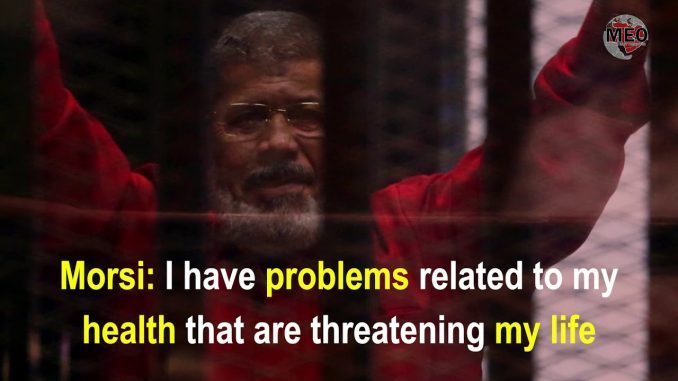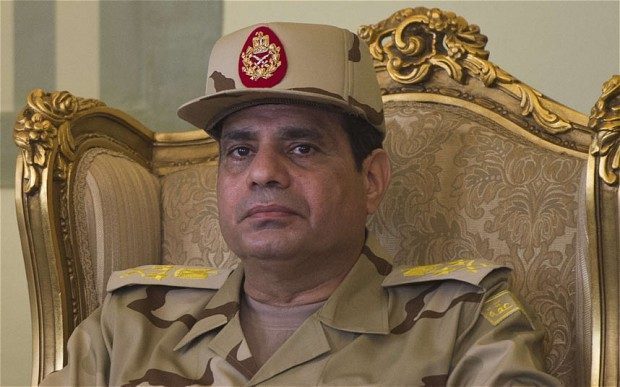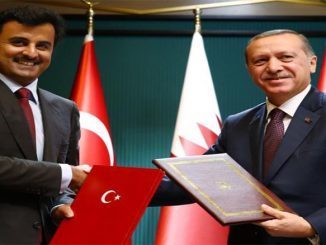
Sadly, the ill treatment Mohamed Morsi received in jail was not unusual. Also, Egyptian officials reportedly threatened Morsi days before death, according to MEE.
When Egypt’s first and only elected president, Mohamed Morsi, dropped dead in a courtroom last week, official Washington barely noticed, says Eli Lake in a report in Bloomberg on Monday, continuing his report as follows:
President Donald Trump was focused on the crisis in Iran. His administration has made clear that autocratic allies like Egyptian President Abdel-Fattah El-Sisi will not be shamed and cajoled for how they treat their dissidents. Besides, Morsi was a member of the Muslim Brotherhood, which the Trump administration has considered designating as a terrorist organization.
Morsi’s death, however, should be a wake-up call, particularly for Secretary of State Mike Pompeo. In a letter to Pompeo, a bipartisan group of Egypt experts says that Morsi’s death was likely a result of the poor conditions of his incarceration. “Not only was Morsi kept in prolonged total isolation and allowed only three family visits over six years,” reads the letter from the Working Group on Egypt. “Prison officials denied him medical treatment for diabetes as well as kidney and liver conditions.” Indeed, a British parliamentary investigation warned more than a year ago that Morsi may die as a result of his treatment in prison.
And while it may be easy for the Trump administration to dismiss this kind of advocacy from human-rights groups, the working group is different. Until this year, Elliott Abrams, who currently serves as Trump’s special representative for Venezuela, was a member.
Sadly, Morsi is hardly the only Egyptian prisoner suffering through gulag-like conditions. As the letter says, “while Morsi’s treatment was notably cruel, it was not unusual.” Of the 60,000 political prisoners in Egypt’s overcrowded jails, many lack basic sanitation, the letter says. Higher-profile prisoners often endure months, and sometimes years, of solitary confinement.
It would be bad enough if El-Sisi’s prisons were filled only with members of the Muslim Brotherhood. But this treatment applies to a range of Egyptians with a wide variety of political views. Sami Anan, a former chief of staff to Egypt’s military who was arrested while running against El-Sisi in the 2018 election, has suffered a serious infection since his incarceration. Hisham Geneina, a former state auditor who exposed corruption in the military, has been denied medical treatment for injuries sustained during a mob attack. There are thousands of similar cases, the letter says.
El-Sisi’s jails also hold American citizens. Mustafa Kassem, a U.S. businessman, was arrested when Egyptians were rounded up during the 2013 coup that initially brought El-Sisi to power. His initial crime, according to his brother-in-law, was that he handed over his U.S. passport to an Egyptian soldier, thinking it would protect him. Instead, he was accused of being a spy. As a diabetic with a heart condition, his family fears that his death is imminent if he remains in Egyptian jail.
If a state is going to imprison people, it owes them basic medical care. This is as true for convicted criminals as it is for political prisoners, who should not be detained in the first place.
There is also a strong national interest reason that Pompeo and Trump should pressure El-Sisi to make his prisons more humane. Egypt’s modern dictators never know when their foes will strike. But strike they always do. Gamal Abdel Nasser came to power in a military coup. His successor, Anwar Sadat, was assassinated by disgruntled Islamists who had infiltrated the military. Sadat’s successor, Hosni Mubarak, didn’t know that his military would defy his orders to use lethal force against the citizens who had gathered in Tahrir Square.
Amy Hawthorne, the research director at the Project on Middle East Democracy and a member of the working group, told me the cruel conditions of El-Sisi’s prisons could create a backlash: It “drives people underground, widening the base of people who have serious grievances against the regime.” Al Qaeda’s current leader, Ayman Al-Zawahiri, was tortured in an Egyptian prison. His experience there has helped nurse his radicalism ever since.
El-Sisi may think he needs these dungeons to keep his enemies down. But he’s only sowing the seeds of his eventual demise. Pompeo has an opportunity to remind him of his folly — and to take the kind of stand for democracy and human rights that should be the bedrock of U.S. foreign policy.
Egyptian officials threatened Morsi days before death: MEE reports
On 25 June 2019, Middle East Eye published an exclusive report by David Hearst stressing that former president was threatened by Egyptian officials, days before death. Middle East Eye said Morsi was told to disband Muslim Brotherhood or face consequences in secret talks with top officials, although Morsi had no relation to the Brotherhood since he was democratically elected as Egypt’s first and last freely elected civil president.
Mohamed Morsi and Muslim Brotherhood leaders in prison in Egypt were given an ultimatum by top officials to disband the organization or face the consequences, according to Middle East Eye.
They had until the end of Ramadan to decide. Morsi refused and within days he was dead, MEE report states, continuing as follows:
Brotherhood members inside and outside Egypt now fear for the lives of Khairat el Shater, a former presidential candidate, and Mohammed Badie, the supreme guide of the Brotherhood, both of whom refused the offer.
The demand to Morsi and Brotherhood leaders to close the organisation down was first outlined in a strategy document written by senior officials around President Abdel Fattah el-Sisi which was compiled shortly after his re-election last year.
Middle East Eye has been briefed about its contents by multiple Egyptian opposition sources, one of whom had sight of it and who spoke about it on condition of anonymity.
The sources told MEE they were aware of the document and the secret negotiations with Morsi before his sudden death in prison last Monday.
‘Closing the file of the Muslim Brotherhood’
Some details of the protracted contacts between Egyptian officials and Morsi over the last few months have been withheld for fear of endangering the lives of prisoners.
Entitled “Closing the file of the Muslim Brotherhood”, the government document argued that the Brotherhood had been delivered a blow by the military coup in 2013, which was unprecedented in its history and bigger than the crackdowns the Islamist organisation faced under former presidents Nasser and Mubarak.
The document argued that the Brotherhood had been fatally weakened and there was now no clear chain of command.
It stated that the Brotherhood could no longer be considered a threat to the state of Egypt, and that the main problem now was the number of prisoners in jail.
The number of political prisoners from all opposition factions, secular and Islamist, is estimated to be about 60,000.
The government document envisaged closing the organisation down within three years.
It offered freedom to members of the Brotherhood who guaranteed to take no further part in politics or “dawa”, the preaching and social activities of the movement.
Those who refused would be threatened with yet further harsh sentences and prison for life. The document thought that 75 percent of the rank and file would accept.
If they agreed to close the movement down the leadership would be offered better prison conditions.
Pressure on Morsi
Huge pressure was applied on Morsi himself, who was held in solitary confinement in an annex of Tora Farm Prison, and kept away from lawyers, family or any contact with fellow prisoners.
“The Egyptian government wanted to keep this negotiation as secret as possible. They did not want Morsi to confer with colleagues,” one person with knowledge of events inside the prison said.
As negotiations dragged on, Egyptian officials became increasingly frustrated with Morsi, and the senior Brotherhood leadership in prison.
Morsi refused to talk about closing down the Brotherhood because he said he was not its leader, and the Brotherhood leaders refused to talk about national issues such as Morsi renouncing his title as president of Egypt and referred the officials back to him.
The deposed president refused to recognise the coup or surrender his legitimacy as elected president of Egypt. On the issue of ending the Brotherhood, he said he was the president of all Egypt and would not compromise.
“This continued for some time. Efforts were intensified in Ramadan. The regime became frustrated and they made it clear to other leaders that unless they persuaded him to give up and negotiate by the end of Ramadan, the regime would take other actions. They did not specify which,” sources with knowledge of the events told MEE.
For this reason, the sources who spoke to MEE believe Morsi was killed and that the other Brotherhood leaders who refused the demand to disband the organisation are now in mortal danger.
Morsi died aged 67 last Monday shortly after collapsing in court where he was facing a retrial on charges of espionage. Egyptian authorities and state media reported that he had suffered a heart attack.
But concerns that the conditions in which he was being held posed a threat to his health had been raised for years by his family and supporters, who said he had been denied adequate medical care for diabetes and a liver disease.
One Egyptian figure said: “ My analysis is that they decided to kill him at that particular time (the seventh anniversary of the second round of presidential elections). This explains the timing of his death. The main reason they decided to kill him was that they concluded he would never agree to their demands.”
The document was not the first offer that had been made to Brotherhood prisoners by Sisi’s government.
Before the 2018 document, there had been two offers made to them: release on condition of not engaging in politics for a specific time, and release on condition of not engaging in politics, but being allowed to continue with “dawa”, or the religious life of the community. Neither offer had been taken up.
Morsi’s death has sparked strong public criticism of his treatment. Ayman Nour, a former presidential candidate and political opponent, said Morsi had been “killed slowly over six years”.
“Sisi and his regime bear full responsibility for the outcome, and there is no other option but international arbitration into what he was subjected to, medical negligence and deprivation of all rights,” Nour, who now lives in exile, tweeted.
Secrets to share
In the final moments, Morsi urged a judge to let him share secrets which he had kept even from his lawyer, MEE reported.
Morsi said he needed to speak in a closed session to reveal the information – a request the deposed president had repeatedly appealed for in the past but never been granted.
Standing before the court, Morsi said he would keep the secrets to himself until he died or met God. He collapsed soon after.
Earlier in the same court session, fellow detainees Safwat al-Hejazi, an Islamist preacher, and Essam al-Haddad, who served as Morsi’s foreign affairs advisor, asked the judge to consider holding court sessions less frequently.
Haddad’s son Abdullah told MEE he fears his father and brother Gehad, who is also imprisoned, will share Morsi’s fate.
“There are many others who are on the verge of death and unless the international community speaks out and demands others to be released, many more will die, including my own father and brother,” he said.
MEE has contacted the Egyptian embassy in London to ask for comment on the document and the negotiations between the government and Morsi and senior Brotherhood officials in the months and weeks before his death.
The Egyptian foreign ministry last week condemned calls by the Office of the UN High Commissioner for Human Rights for an independent investigation into Morsi’s death.
A spokesperson for the foreign ministry said calls for an inquiry were a “deliberate attempt to politicise a case of natural death”.



